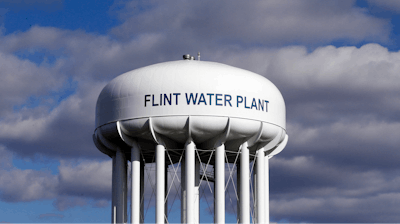
WASHINGTON (AP) — A federal watchdog is calling on the Environmental Protection Agency to strengthen its oversight of state drinking water systems nationally and respond more quickly to public health emergencies such as the lead-in-the water crisis in Flint, Michigan.
In a 74-page report released Thursday, the EPA's inspector general report pointed to "oversight lapses" at the federal, state and local levels in the response to Flint's contaminated drinking water.
"While oversight authority is vital, its absence can contribute to a catastrophic situation," the inspector general, Arthur A. Elkins, said in a statement. His office has concluded the EPA was too slow and passive in responding to the Flint crisis.
The finding comes as the Trump administration seeks to cut the EPA's budget, including some drinking-water programs. The administration also has called for reining back federal environmental regulation overall and transferring more oversight authority of some programs to the states.
The EPA said in a statement it agrees with the inspector general's recommendations and is adopting them "expeditiously."
"The agency is actively engaging with states to improve communications and compliance with the federal Safe Drinking Water Act to safeguard human health," the statement said.
But the internal watchdog said the agency's proposal for stepping up oversight falls short.
Flint's tap water became contaminated in 2014 after officials switched from the Detroit system to the Flint River to save money, exposing many residents to lead, a potent neurotoxin. Children are particularly vulnerable, and the EPA says there is no safe level of lead.
EPA officials had stressed they had wanted to foster a collaborative partnership with Michigan, the report said. In Flint, the quest for "partnership limited effective EPA oversight."
Rep. Dan Kildee, who was traveling to Flint on Thursday to inspect work done on the city's water system, said the state bore most of the blame for the slow response to the health crisis, but also said "the EPA should have been more aggressive."
"EPA should not have taken the state of Michigan at its word" that everything was fine with Flint's water, said Kildee, D-Mich. "Water quality is too serious a question ... without doing more to assure the rule is being properly enforced."
The switch to the Flint River was to be temporary, until the city could connect to a planned regional pipeline from Lake Huron. At that time, the impoverished majority-black city of nearly 100,000 residents was under control of an emergency financial manager appointed by Republican Gov. Rick Snyder.
Residents complained the river water smelled and tasted bad and was causing skin rashes and other health problems. Local officials insisted it was safe.
After tests showed high levels of lead in a home in April 2015, Miguel Del Toral, a water regulations official in EPA's Chicago office, contacted officials with Michigan's Department of Environmental Quality. Del Toral also alerted superiors at EPA who decided not to make the information public, instead prodding the state agency to act behind the scenes. After a draft of Del Toral's report was leaked, EPA's regional administrator apologized to the city.
In emails later released through public-records requests, Del Toral voiced frustration over EPA's slow pace and described the agency as a "cesspool."
State officials finally acknowledged the lead contamination in September 2015 after doctors reported high levels of lead in Flint children's blood and Virginia Tech University researchers said their testing of Flint water samples found some with lead levels meeting EPA's definition of "toxic waste."
Snyder ordered the National Guard to distribute bottled water and filters, requested federal aid and eventually accepted the resignation of his top environmental official. Flint returned to the Detroit water system.
In January 2016, the EPA notified Michigan that its actions were inadequate and ordered stronger intervention. The agency's regional administrator in Chicago, Susan Hedman, resigned the next month. The preliminary inspector general's review later that year found that the regional EPA office should have had "a greater sense of urgency" and was too deferential to the state.
Former EPA Administrator Gina McCarthy acknowledged during congressional hearings that her agency should have been more aggressive in testing the water and requiring changes but said the federal agency "couldn't get a straight answer" from Michigan officials about what was being done in Flint.
"We were strong-armed. We were misled," McCarthy said. "We were kept at arm's length. We could not do our jobs effectively."
Republican lawmakers accused McCarthy and the Obama EPA of incompetence and neglect.
Snyder ended water distribution in Flint last April, saying water quality had improved significantly. The state environmental agency this week said tests during the latest six-month monitoring showed lead levels were beneath the action threshold and better than those of some other Michigan cities.
The Michigan attorney general's office has filed criminal charges against 15 state and local officials in the Flint matter, which also has spawned numerous lawsuits.






















